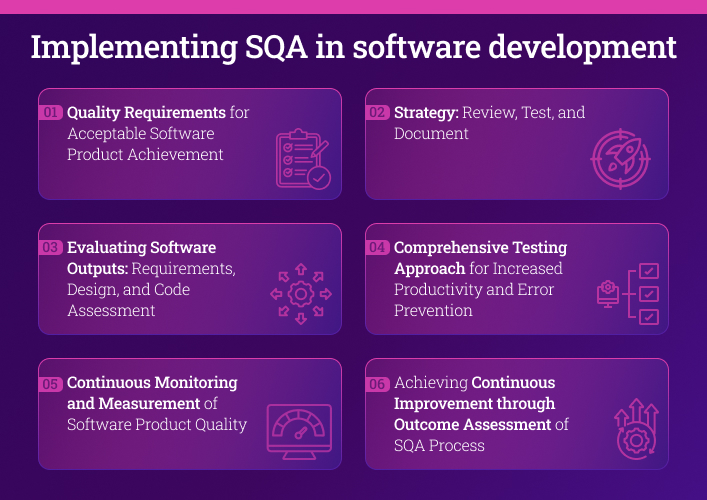Importance of Software Quality Assurance
The software quality assurance (SQA) process is not only an additional stage in the development procedure; rather, it operates in conjunction with the software development life cycle. Companies have a responsibility to check that every component of the software, whether internal or external, lives up to the criteria that have been established. SQA performs independent tests on each step of this procedure in order to discover potential problems before they escalate into serious difficulties.
Principles of SQA
- It is usually preferable to avoid having mistakes and defects in the software product in the first place rather than having to fix them afterward. As a result, the first principle of SQA stresses the significance of locating and fixing possible problems at an early stage in the software development lifecycle.
- In contrast to quality control, software quality assurance focuses on eliminating mistakes and flaws by addressing their origins rather than just addressing their effects.
- The SQA examination is not a one-time event. It is more similar to a continuous process that has to be included in every stage of your software development. To put it another way, the second principle, which is known as continuous enhancement, emphasizes how important it is to continually monitor and enhance the quality of the software product.
- SQA requires that customers, programmers, testers, QA team leaders, and project managers, be actively involved in the software development process. As a result, the third principle emphasizes the need for cooperation and communication among all parties participating in the software development process in order to guarantee that the process will go well.
- It has to concentrate on locating and mitigating the risks that are the most serious in the software product. To put it more simply, this concept highlights the significance of prioritizing risks depending on the possible effect they might have on the software.
Implementing SQA in software development

It is very necessary to adopt a systematic methodology in order to successfully execute SQA. To put SQA into action, you may follow the procedures that are outlined below:
- Clearly outline the quality requirements that your software product has to achieve in order to be considered of acceptable quality.
- Create a strategy for the software quality assurance activities that will be carried out throughout the software development life cycle. Activities like reviewing, testing, and documenting should be included in this strategy. Additionally, it should explain who will be accountable for each task as well as the time frame in which it will be carried out. Still, 35% of companies don’t have experienced professionals to test software. Thus, hiring a professional software tester is recommended.
- Evaluate software outputs including requirements, design, and code as part of your software development process.
- Execute many forms of testing, including unit testing, regression testing, and integration testing. Increase productivity while decreasing the likelihood of errors caused by human error by using automated testing solutions.
- Throughout the whole process of developing the software product, it is important to monitor and measure the product’s quality.
- The SQA process should be improved regularly by assessing the outcomes of the monitoring and measuring activities in order to achieve continuous improvement.
Conclusion
In conclusion, software quality assurance is an essential procedure that assures the dependability, performance, and overall quality of software products. It entails carrying out a complete array of actions and procedures with the goals of discovering and fixing errors, following standards and criteria, and enhancing the quality of the user experience. SQA is a very important component in limiting risks, improving the level of satisfaction experienced by customers, and preserving the reputation of software development businesses.
Businesses have the ability to reduce the number of expensive mistakes, provide customers with software solutions that are sturdy and trustworthy, and cultivate user trust by putting efficient SQA methods into action. To succeed in today’s fast-paced and competitive technological world, it is essential to place a priority on software quality assurance if one wants to differentiate oneself from the competition and achieve commercial success.
FAQs
How does software quality assurance contribute to the overall success of a software project?
What are some common challenges and obstacles faced in implementing effective software quality assurance practices?
What are the key components of an effective software quality assurance strategy?
What are the consequences of poor software quality assurance?
How does software quality assurance contribute to regulatory compliance?
Ravi Bhojani is the Chief Marketing Officer (CMO) at Alian Software, where he spearheads the company’s marketing strategies and drives its brand presence in the competitive IT services landscape. With over a decade of experience in the technology and marketing sectors, Ravi has consistently demonstrated his ability to blend innovative marketing techniques with deep industry knowledge to deliver outstanding results.